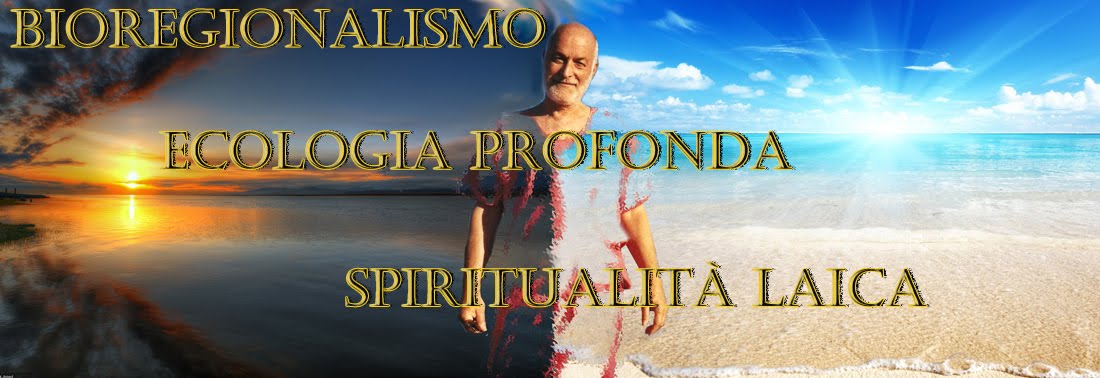
Transpersonal psychology is certainly a branch of natural or lay spirituality but, before talking about this form of self-investigation, I would like here to confirm that I use the term "spirituality" (there being no other available) in the original sense of the name, as adopted in antiquity to identify the "living presence" in matter, in the form of Consciousness.
The ancients used the term "spiritus loci" to define the soul of the place but also of the woods, rivers, animals and human society, etc.
"Spirit" is therefore the name of that subtle "presence" and I think it is more than right to restore the true and ancient word rather than look for a new one. The falsified and instrumental use of the word "spirit" attributable to patriarchal religions (Judaism, Christianity, Islam) is not enough to give it up.
Everything is Spirit
It is better and "ecologically" preferable to live in communion with the "presence" rather than discussing the existence in sophisticated terms.
The original meaning of the word "spirit" is that of "intelligence / conscience", the same that integrates and transcends the "Es" of transpersonal psychology.
In the archetypal analysis we can not neglet the advanced psychic search, started with Jung, projected in the Wilber and Grof schemes. A synthesis of rarefied thought that reaches the limit of the psychologically experimentable.
In the densest stage there is the Shadow that represents the obvious conditions, pride and the need for success, it pushes toward romantic and idealized love and its counterpart is hatred and sense of guilt. It follows the level of the Ego that allows an intellectual approach and contributes to verbal communication and linear thinking while counteracting spontaneity and equanimity.
In the sphere of the Biosocial culture and civilization it develop the sense of social belonging, at the same time It rises the sense of convention and repetition (traditions). On the subtle plane, the Existential, arises intentionality, faith or religion, and at the same time existential anxiety (inability to accept death) and metaphysical discomfort; here we perceive the primary dualism.
At the Transpersonal stage there is a detachment, an awareness of the meaning of the myths, prana reaches the elevated chakras (sephirot), recognizing them symbolically, is at this point that the primordial archetypes and the vacuum at the limit of the mind burst in evidence. This state is described by Gurdjeff as "purgatory negativity" a precondition for the loss of individual fixity and absorption into the Self.
This awareness-testimony, calling it if you want "subtle essence", is like an aroma emanating from matter, from which it is deduced that there can be no separation between matter and spirit, in the same way that there can be no separation between the rose and her perfume. Between the humidity and the water. Between the fire and its ability to burn and emit light and heat.
Paolo D'Arpini
Testo Italiano
Ecologia profonda e psicologia transpersonale
La psicologia transpersonale è sicuramente un ramo della spiritualità naturale o laica ma, prima di parlare di questa forma di auto-indagine, vorrei qui confermare che io uso il termine spiritualità (non essendocene altri disponibili) nel senso più originale del nome, quello anche usato nell’antichità per individuare la “presenza viva” nella materia, in forma di Coscienza.
Gli antichi usavano il termine “spiritus loci” per definire l’anima del luogo ma pure dei boschi, dei fiumi, degli animali e della società umana, etc.
“Spirito” è dunque il nome di quella sottile "presenza" e credo sia più che giusto recuperare la parola vera ed antica piuttosto che cercarne una nuova. L'uso falsificato e strumentale della parola “spirito”, imputabile alle religioni patriarcali (giudaismo, cristianesimo, islam), non è ragione sufficiente per rinunciarvi.
Tutto è Spirito
E' meglio ed “ecologicamente” preferibile vivere in comunione con la “presenza” piuttosto che fare discussioni in termini sofistici sull'Esistenza.
Il significato originario della parola “spirito” è quello di “intelligenza/coscienza”, la stessa che integra e trascende "l'Es" della psicologia transpersonale.
Nell’analisi degli archetipi non possiamo trascurare la ricerca psichica avanzata, iniziata con Jung, proiettata negli schemi di Wilber e Grof. Una sintesi sul pensiero rarefatto che raggiunge il limite dello sperimentabile.
Nella fase più densa c’è l’Ombra che rappresenta le condizioni palesi, l’orgoglio ed il bisogno di successo, essa spinge verso l’amore romantico ed idealizzato e la sua controparte è l'odio ed i sensi di colpa. Segue il livello dell’Ego che consente un approccio intellettuale e contribuisce alla comunicazione verbale ed al pensiero lineare e per contro inibisce la spontaneità e la vigilanza equanime.
Nella sfera del Biosociale si sviluppa la cultura e la civiltà ed il senso di appartenenza sociale contemporaneamente si forma il senso di convenzione e di ripetitività (le tradizioni). Sul piano più sottile, l’Esistenziale, sorge l’intenzionalità, la fede o religione, e alla stesso tempo l’ansia esistenziale (incapacità di accettare la morte) ed il disagio metafisico; qui si percepisce duramente il dualismo primario.
Giunti al Transpersonale sorge un distacco, una consapevolezza del significato dei miti, il prana raggiunge i chakra (sephirot) elevati, riconoscendoli simbolicamente, è a questo punto che irrompono gli archetipi primordiali ed il vuoto al limite della mente. Questo stato viene descritto da Gurdjeff come “negatività purgatoriale” una condizione preliminare alla perdita della fissità individuale ed all’assorbimento nel Sé.
Questa consapevolezza-testimonianza, chiamatela se volete “essenza sottile”, è come un aroma che emana dalla materia, dal che se ne deduce che non può esserci separazione fra la materia e lo spirito, allo stesso modo in cui non può esserci separazione fra la rosa ed il suo profumo. Fra l’umidità e l’acqua. Tra il fuoco e la sua capacità di bruciare ed emettere luce e calore.
Paolo D'Arpini


Nessun commento:
Posta un commento
Nota. Solo i membri di questo blog possono postare un commento.